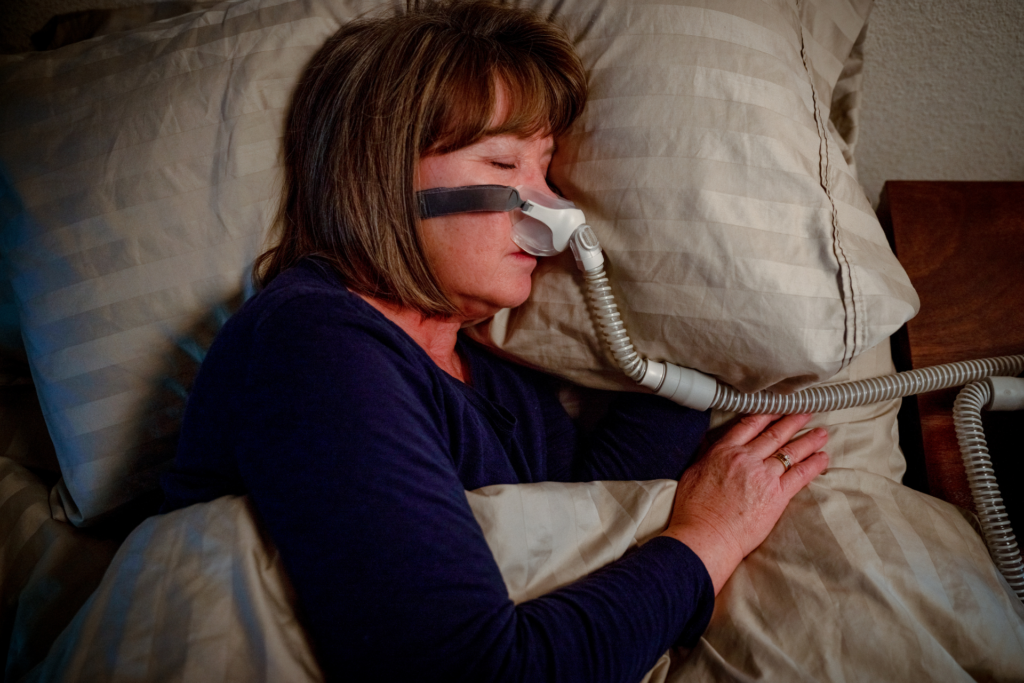Have you ever wondered about the intriguing connection between a deviated septum and sleep apnea? At first glance, it might seem logical to assume that they’re related, given that both conditions involve breathing during sleep.
However, the reality is a little more complex than a straight “yes” or “no” answer.
Sleep apnea comes in various forms, with the most prevalent being obstructive sleep apnea (OSA). OSA occurs when the upper airway becomes partially or completely blocked during sleep, leading to disrupted breathing patterns and repeated awakenings throughout the night.
While a deviated septum can play a significant role in the development or exacerbation of sleep apnea, sleep apnea is often the result of multiple factors coming together. Other elements like obesity, genetics, and lifestyle choices also play a part.
But this doesn’t mean your deviated septum should be ignored! In fact, understanding the role it plays in sleep apnea can be a crucial piece of the puzzle. A deviated septum can significantly contribute to the risk of experiencing sleep apnea episodes, making it an essential factor to consider in the broader context of your sleep health.
What are the Causes of a Deviated Nasal Septum?
A deviated septum occurs when the thin wall (septum) dividing the two nasal passages is askew or shifted from its normal centered position. This displacement leads to an uneven nasal passage.
The reasons behind a deviated septum are quite diverse and often involve a mix of factors, including ones you might have been born with, experiences you’ve had, and even a dash of family history.
Congenital Factors: Some folks start their septum journey right from the get-go. You see, during their time in the womb, certain irregularities can occur in the development of their nasal structure. It’s like a little twist of fate happening before birth. These congenital deviations can range from mild to a tad more pronounced, and they tend to influence how a person breathes from a very early age.
Facial Trauma: Things like car accidents, those moments of sporting enthusiasm, or a clumsy fall can give your septum quite a shake-up. Suddenly, your septum’s alignment might decide to take a detour, leading to an instant change in your breathing patterns. It’s like a twist in your life’s plot, quite literally!
Genetic Factors: You know how families sometimes have that one trait that gets passed down through generations? Well, if you have a family history of septal deviations, you may be more prone to this condition due to inherited nasal characteristics.
How Does a Deviated Septum Affect Your Breathing?
Nasal Congestion: One of the most prevalent symptoms associated with a deviated septum is chronic nasal congestion. This occurs because the misalignment of the septum can obstruct one or both nasal passages, impeding the smooth flow of air.
Frequent Sinus Infections: When your septum goes awry, it can pave the way for an unwelcome sinus infection. Your septum’s misalignment often brings along nasal congestion and erratic nasal breathing patterns. This creates a setting where mucus can linger, and proper drainage becomes challenging.
Difficulty Breathing Through One Nostril: An uneven nasal passage caused by a deviated septum can lead to a noticeable disparity in airflow between the nostrils. This often results in difficulty breathing through one nostril while the other remains relatively unobstructed.
Snoring: The impact of a deviated septum on sleep quality cannot be underestimated. The condition can contribute to snoring, as the disrupted airflow through the nasal passages can lead to vibrations of the soft tissues in the throat.
Can a Deviated Septum Cause Sleep Apnea
The impact of a deviated septum on sleep quality goes beyond just snoring and difficulty breathing. Understanding how it can contribute to the development or exacerbation of sleep apnea requires a closer look at the mechanics involved.
During sleep, relaxation of the muscles occurs throughout the body, including the muscles in the throat and airway. This natural relaxation can reduce the size of the upper airway, potentially making it more collapsible. When combined with the effects of a deviated septum, which already narrows the nasal passages and increases resistance to airflow, the risk of airway obstruction becomes more pronounced.
If you have a deviated septum, then you may find it challenging to maintain a stable and open airway while asleep. The combination of nasal obstruction, airway narrowing, and muscle relaxation can lead to moments where breathing becomes shallow or even stops momentarily.
In short, a deviated septum sets the stage for sleep apnea by creating conditions that make it easier for the airway to collapse or partially obstruct during sleep. While not everyone with a deviated septum will develop sleep apnea, its presence can significantly contribute to the risk of experiencing apnea episodes.
Treatment Options For Sleep Apnea and a Deviated Septum
If you suspect that your sleep quality is affected by sleep apnea symptoms such as loud and persistent snoring, gasping for air during sleep, or frequent awakenings due to breathing difficulties, it’s essential to seek professional evaluation!
Additionally, if you have been diagnosed with a deviated septum and notice worsening sleep disturbances or suspect you may have sleep apnea, it’s advisable to undergo a sleep study or an at-home sleep test.
Understanding the precise cause of your sleep issues, whether related to a deviated septum, sleep apnea, or a combination of factors, is the first step toward effective treatment.
If you have both a deviated septum and sleep apnea, treatment may involve a multi-faceted approach. Addressing the deviated septum through nasal surgery, such as septoplasty or rhinoplasty, can alleviate nasal obstruction. Therapies like continuous positive airway pressure (CPAP) treatment can effectively mitigate the severe health consequences associated with untreated sleep apnea
OSA and Deviated Septum: An Overview
So, does a deviated septum cause snoring and breathing issues? It can certainly contribute, especially in cases of OSA, where airflow obstruction plays a pivotal role. However, it’s crucial to recognize that snoring and sleep apnea are multifactorial conditions influenced by a range of factors beyond your septum’s orientation.
If you suspect that your deviated septum is affecting your sleep and breathing, it’s advisable to consult a healthcare professional. At Sleep Centers of Middle Tennessee, we can assess your specific situation, recommend appropriate interventions, and determine if additional sleep disorder testing is necessary.
Understanding the complex interplay of factors—deviated septum included—is a crucial step toward finding effective solutions. Contact us today, and we can answer your questions and help get your sleep back on track!





